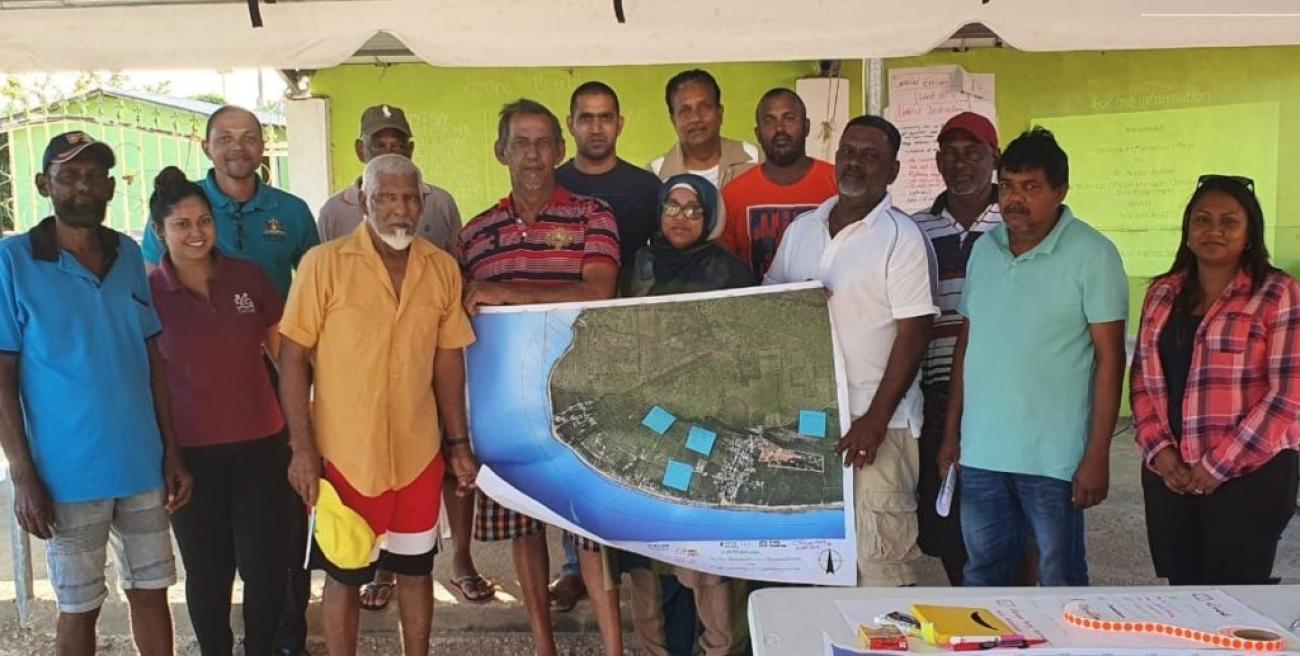The Government and the UN work to build Resilience of Fisherfolk through CC4FISH Project

The workshop brought together 54 local, national and regional stakeholders involved in fisheries, aquaculture, disaster risk management and climate change.
To increase the resilience of fisherfolk in Trinidad and Tobago and the wider Caribbean, the Food and Agriculture Organization (FAO), in collaboration with the Fisheries Division (FD), Ministry of Agriculture, Land and Fisheries (MALF) of Trinidad and Tobago rolled out the “Climate Change Adaptation in the Eastern Caribbean Fisheries Sector” (CC4FISH) project was implemented by FAO over the period 2017-2020. The CC4FISH project also worked to create better understanding and awareness of climate change vulnerability, create resilience of fisherfolk organizations and aquaculturists, and improve governance by mainstreaming climate change adaptation in multilevel fisheries governance.
The project started with a National Launch Workshop of the CC4FISH-TT in Chaguanas on 22 July 2019 . The workshop brought together 54 local, national (including civil society organisations [CSOs] and non-governmental organizations [NGOs] across Trinidad and Tobago) and regional stakeholders involved in fisheries, aquaculture, disaster risk management (DRM) and climate change adaptation (CCA). The workshop also consisted of working group discussions which were aimed at further informing the project’s activities within Trinidad and Tobago towards successful implementation. Financial support was provided by FAOTT through the Global and Environmental Facility (GEF) fund.
A Tobago group of over 115 fishers, staff of the Department of Marine Resources and Fisheries (DMRF), the Occupational Safety and Health Department in Tobago, the Coastal Zone Management Unit (CZMU), the Trinidad and Tobago Coast Guard (TTCG) and representatives from fisherfolk associations, participated in and benefited from Information and Communication Technology (ICT) Training Sessions across five days in Tobago on 4-8 November 2019. The training was funded by the FAO CC4FISH-TT project and was facilitated by the Caribbean ICT Research Programme (CIRP) of The University of the West Indies in Trinidad and Tobago in collaboration with the DMRF. The training sessions involved the use of three ICT devices most important to safety at sea for small scale fishers: the handheld marine band Very High Frequency (VHF) radio, the handheld Global Positioning System (GPS) unit and the cellphone. A warm thanks to everyone who contributed to these sessions.
On 22 November 2019, the CC4FISH project supported sargassum management in Tobago by donating 41 pairs of boots to the Division of Infrastructure, Quarries and the Environment (DIQE), Tobago House of Assembly, to assist Units charged with the manual clean up sargassum along Tobago’s beaches when necessary.
The Caribbean Natural Resources Institute (CANARI) was contracted by FAO to undertake the regional implementation of a Vulnerability and Capacity Assessment (VCA) in coastal and fishing communities under CC4FISH. This involved implementation of VCAs in 6 coastal and fishing communications across Trinidad and Tobago, which includes Blanchisseuse, Icacos, Matelot and Moruga in Trinidad and Roxborough and Speyside in Tobago. As a key first step, CANARI supported the establishment of the local field teams in T&T, with a focus of specific VCA tools selected for the six target communities under the project. On 4-5 December 2019, CANARI facilitated a VCA training workshop, which was held at the Waterloo Community Centre, Carapichaima, Trinidad.
On 13-18 January 2020, a Regional Training Course on Fisheries Statistics and Damage and Loss Collection was held under the CC4FISH project in collaboration with the Ministry of Agriculture, Land and Fisheries (MALF). The training course, which brought together at total of 36 regional, national and local participants, was held at the Scarlet Ibis Conference Room within the MALF, Chaguanas, Trinidad. The facilitators of the training course included Dr. Gert-jan de Graaf (FAO), Mr. Yann Laureant (FAO), Dr. Isaac Dialsingh (UWI), Dr. Vrijesh Tripathi (UWI), Mr. Asad Mohammed (UWI), Ms. Lara Ferreira (MALF) and Ms. Stefania Savore (FAO). Participants learned the importance and used of fisheries information, new data collection strategies and methods, sampling design for small scale fisheries routine data collection, analyses of data, how to use ones data for fisheries management and things to consider when undertaking a damage assessment.
Click here to view the multimedia products which were developed recently under the FAO CC4FISH project, including a video on Enhancing Safety at Sea of Fisherfolk through ICT Training (Adapting to Climate Change) produced by CIRP and the latest Sargassum Sub-Regional Outlook Bulletin produced by UWI-CERMES.



